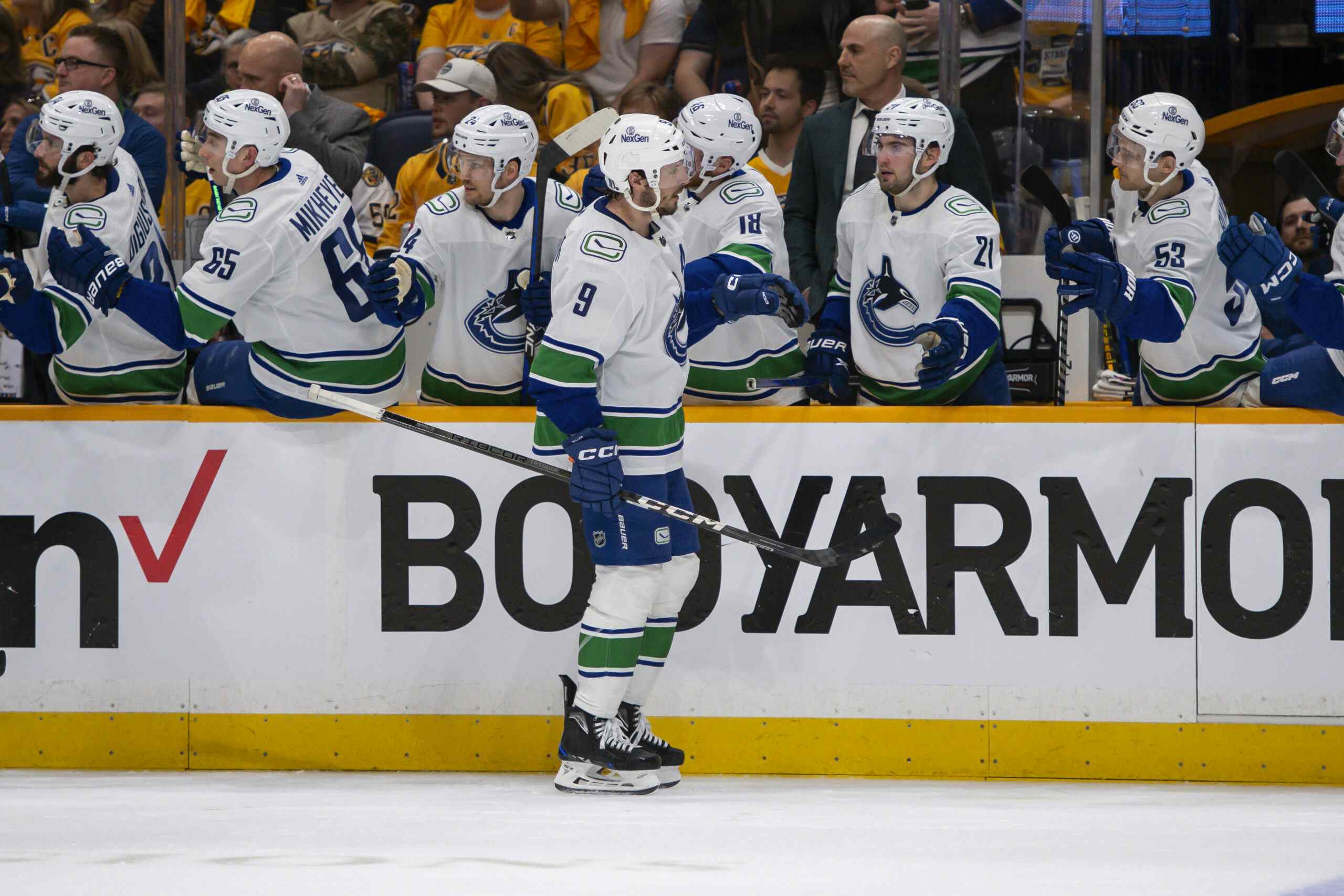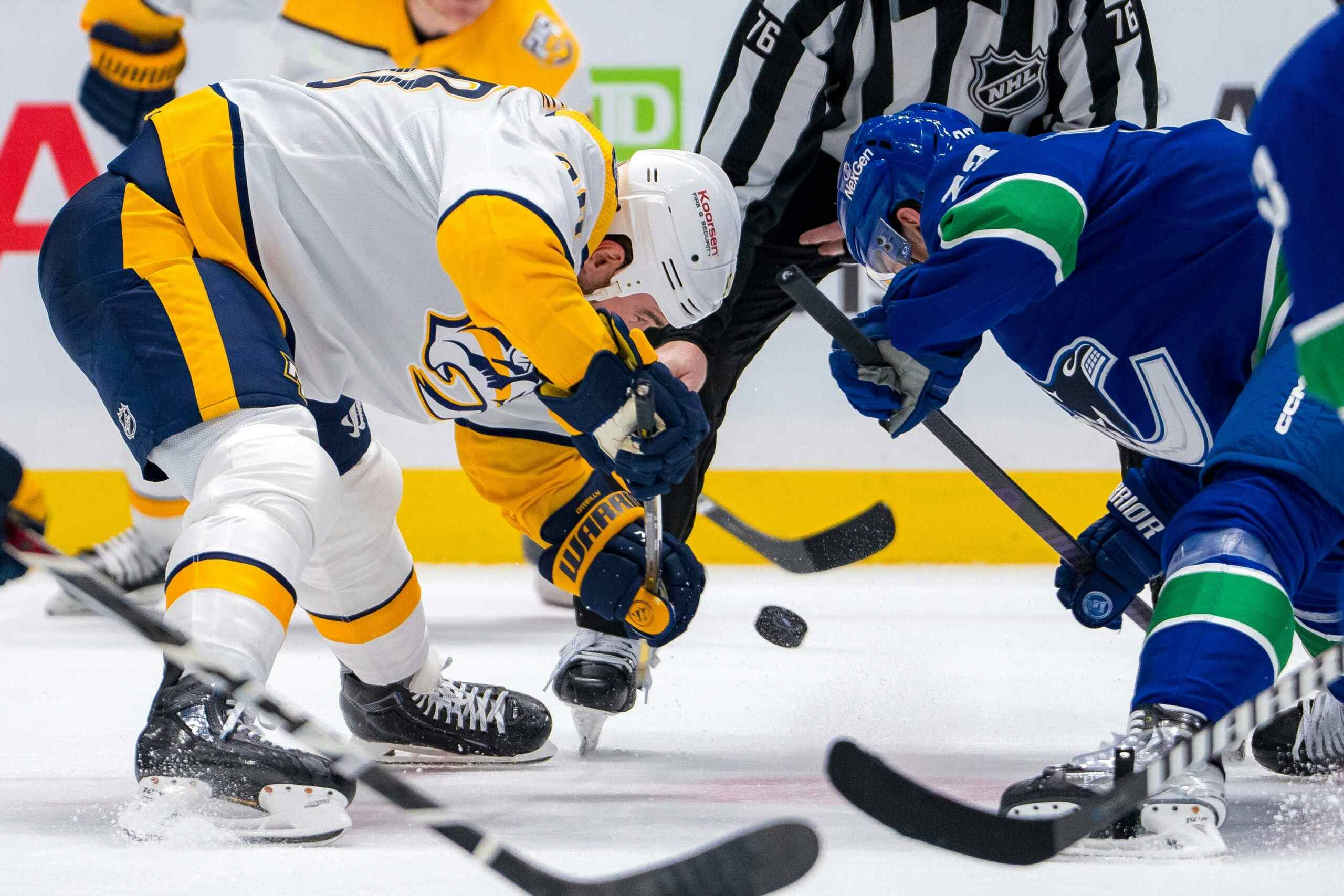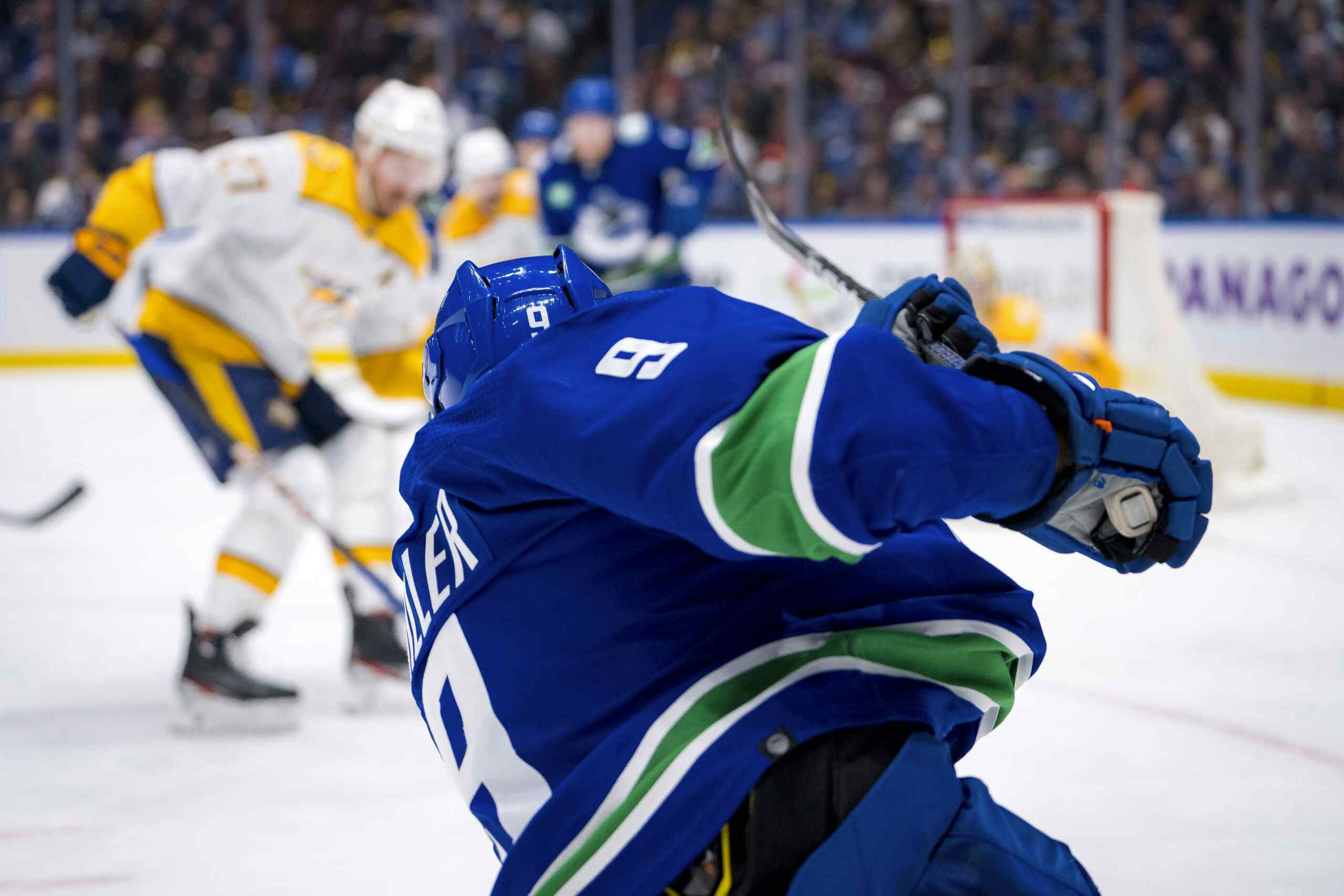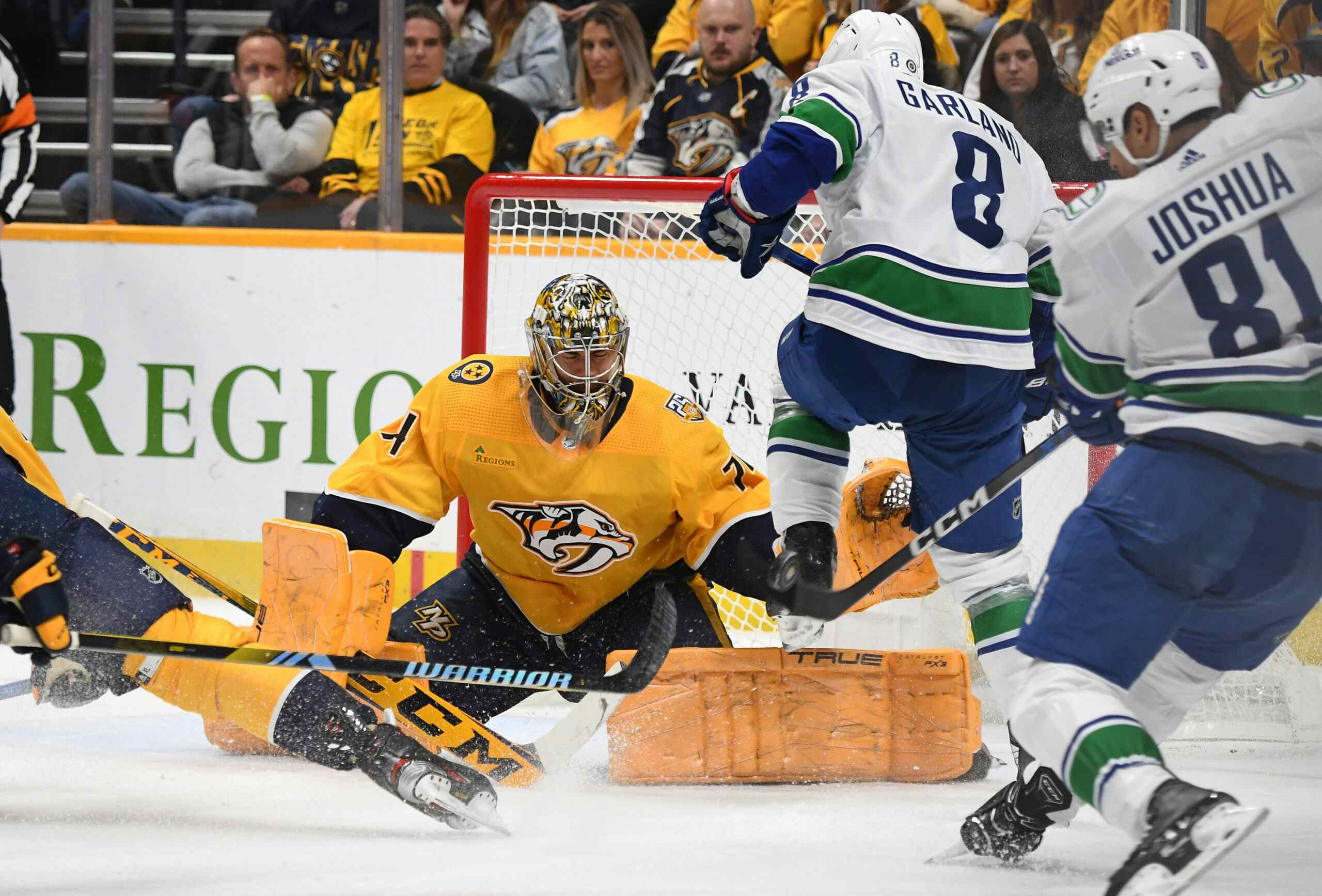Cory Schneider Gets Bounced, Canucks Get Pushed to the Brink

The cold, harsh reality is beginning to sink in.
It all feels kind of silly now, sure, but heading into Game 3 between the Sharks and Canucks there were legitimate reasons for optimism, and belief that the series wasn’t lost quite yet. We expected a tight series coming into it, and that’s what we were getting; the Canucks were down 0-2, but they were definitely in both games, and certainly didn’t look overmatched. A few bounces here and there, and the series score easily could have been flipped.
While Game 2 had ended in a disheartening fashion, there were positives to be taken from it. It looked as if the beast inside Ryan Kesler had been awakened, the Sedins were starting to get something brewing, and the team’s penalty killing unit had seemingly made an adjustment which held the opposition’s man advantage in check.
But then Game 3 happened, and that optimism now seems like something from the distant past. The Canucks were soundly beaten by the Sharks on Sunday night, really getting outclassed throughout. With the 5-2 loss, the team has now been pushed to the brink and reality is beginning to sink in.
Rather than just saying they all suck, let’s try to rationally make sense of the entire situation, and figure out what went wrong.
I have a few remarkable stats for you to kick things off:
a) Dating back to the start of the 2011 Stanley Cup Finals, the Vancouver Canucks have 20 goals in their last 15 playoff games combined.
b) The Vancouver Canucks and San Jose Sharks have played 6 times now this season. The quickest the Canucks have scored on the Sharks in any of those 6 contests came in Game 3, when Alex Burrows scored 11:07 into the 2nd. Think about that for a second. They’ve been playing catch-up against them all year. And to top it all off, they have managed just 10 goals combined in those 6 games.
As has been the case with the coverage of this team all year long, much of the discussion surrounding this game will have to do with the goaltending situation. After playing two very strong games, Roberto Luongo was sent to the bench as the team deemed that it was Cory Schneider’s turn. Obviously this raised a few eyebrows given how well Luongo had played to start this series, but it has been made clear all along that the team’s brass has picked Schneider as "their guy", and that they will give him every opportunity to make this "his team". The goaltending decision for this game had little to do with the present situation that the team finds itself in, and more to do with the future outlook.
And yet I still thought that Schneider played a fine game through 40 minutes, keeping the team in it as his predecessor had done in the previous two games. Unfortunately for him, things fell apart in a hurry after he gave up a brutal goal to Logan Couture just 1:40 into the final frame. It was a goal that can only be described as a "back-breaker". Just 9 seconds later, Patrick Marleau made the laughable duo of Edler and Bieksa look silly, as he split them en route to scoring a sweet goal of his own. Schneider’s night ended roughly two minutes later, after a Couture bomb on the power play – that he had little chance on, by the way – got by him.
Sure, it may have been a different game if he hadn’t given up the mcsofty that made it a 3-1 game, but I honestly hadn’t really seen anything from the team that would have given me any confidence that they were even capable of scoring a second goal. I’d describe the offensive effort by the entire team as hapless, and discombobulated. I’m sick of seeing people lay the blame on things that don’t deserve it. This team can’t generate any sort of sustained meaningful offense at 5v5, and its secondary scorers have already gone on vacation. That’s the problem.
The most disappointing line was Kesler’s, without question. After his successful run down the middle in Game 2, he slotted back in there once again, centering Higgins and Hansen. They were given every opportunity to succeed; they started the majority of their shifts in the offensive zone, and their most common opponents were the plodding duo of Brad Stuart and Scott Hannan. Yet they did not create a single scoring chance.
Quite frankly I would have forgotten about Kesler’s existence in this one were it not for his early run-in with Marleau (where an errant high stick nearly took his head off), and more prevalently, the way the team was misusing him on the power play. I thought that having him at the point with the man advantage was a bad idea to begin with. The fact that that particular formation generated a power play goal in Game 2 did nothing to change my mind, either. At some point you’d like to think that the coaching staff would put down their hard liquor, and realize that putting your most dynamic player farther away from the net in a stationary position probably isn’t the best way to utilize him. Maybe that light bulb will go off in the summer, when they’re all distributing their resumes throughout the league.
What made the team’s inability to field their most effective five man unit while on the power play even more infuriating was the fact that San Jose’s power play was just so darn good. They made the most of their 7 opportunities by generating 13 scoring chances, and 3 goals. And this came after a very strong performance by Vancouver’s penalty kill which effectively stifled them in Game 2. I distinctly remember Thomas Drance writing about how the Canucks needed to adapt, and avoid taking ticky tack penalties in his Game 1 recap, because this unit is scary good. Then Dale Weise happened. Again.
After days of pleading with the coaching staff to put Zack Kassian with the Sedins, the fans got their wish.. in the third period of a game that was out of hand. I thought Kassian was one of the lone bright spots yet again, as he continues to show an inherent ability to create plays for his team out of seemingly nothing. You’d like to think that we’ll see that line a lot to start Game 4, but who really knows. While Alex Burrows scored a sweet goal off of a one-timer – in large part due to the brilliance of Henrik – he has seemed off all series. Tonight wasn’t an exception, despite the goal.
I’m really not quite sure I even have words for Kevin Bieksa’s performance in this one. I actually do feel bad tearing into him, because he’s most likely hurt. I’d expect to learn of some debilitating injury that he has been playing through, which will require surgery as soon as the Canucks are eliminated. It’s the only possible explanation. His night featured a litany of reckless turnovers, horrible timing in getting over to help his defensive partners, and just a general inability to bring anything useful to the table. I continue to insist that him being paired with Alex Edler should be outlawed. While he spent a large chunk of his night paired with Alberts, surprise surprise one of the odd shifts that he spent with Edler resulted in a goal for the Sharks where the both of them were made to look foolish.
Let’s end this on a positive note: at least Tom Sestito got a cool experience that he can tell his grandchildren about, right! I wonder if he’ll throw in the part about how he got to play over a vastly superior player that could have actually helped the team in their attempt to win the game. Probably not.
Scoring Chance Data
A chance is counted any time a team directs a shot cleanly on-net from within home-plate. Shots on goal and misses are counted, but blocked shots are not (unless the player who blocks the shot is “acting like a goaltender”). Generally speaking, we are more generous with the boundaries of home-plate if there is dangerous puck movement immediately preceding the scoring chance, or if the scoring chance is screened. If you want to get a visual handle on home-plate, check this image.
Scoring Chance Totals:
| 1st Period | 2nd Period | 3rd Period | Totals | |
|---|---|---|---|---|
| Canucks (EV) | 3 (1) | 1 (1) | 3 (3) | 7 (5) |
| Sharks (EV) | 7 (3) | 8 (6) | 11 (4) | 26 (13) |
Individual Scoring Chance Contributions:
| Individual | Chances Taken | Chances Assisted | Chances Total |
|---|---|---|---|
| Derek Roy | 1 | 2 | 3 |
| Daniel Sedin | 2 | 0 | 2 |
| Henrik Sedin | 0 | 2 | 2 |
| Mason Raymond | 1 | 0 | 1 |
| Dan Hamhuis | 1 | 0 | 1 |
| Alex Burrows | 1 | 0 | 1 |
| Zack Kassian | 1 | 0 | 1 |
Individual Scoring Chance Differential:
| Individual | EV F – A | PP F – A | SH F – A | Total F – A |
|---|---|---|---|---|
| Henrik Sedin | 2-5 | 1-0 | 0-0 | 3-5 |
| Daniel Sedin | 2-5 | 1-0 | 0-0 | 3-5 |
| Alex Burrows | 1-1 | 1-0 | 0-7 | 2-8 |
| Ryan Kesler | 0-3 | 1-0 | 0-9 | 1-12 |
| Chris Higgins | 0-4 | 0-0 | 0-2 | 0-6 |
| Jannik Hansen | 0-4 | 1-0 | 0-2 | 1-. |
| Derek Roy | 3-2 | 1-0 | 0-4 | 4-6 |
| Mason Raymond | 3-3 | 1-0 | 0-2 | 4-4 |
| Zack Kassian | 3-5 | 0-0 | 0-0 | 2-5 |
| Max Lapierre | 1-2 | 0-0 | 0-0 | 1-2 |
| Dale Weise | 0-2 | 0-0 | 0-0 | 0-2 |
| Tom Sestito | 0-2 | 0-0 | 0-0 | 0-2 |
| Dan Hamhuis | 3-4 | 1-0 | 0-5 | 4-9 |
| Jason Garrison | 2-2 | 1-0 | 0-11 | 3-13 |
| Alex Edler | 0-6 | 1-0 | 0-5 | 1-11 |
| Kevin Bieksa | 0-8 | 0-0 | 0-2 | 0-10 |
| Frank Corrado | 1-3 | 0-0 | 0-0 | 1-3 |
| Andrew Alberts | 2-4 | 0-0 | 0-1 | 2-5 |
External Resources
Recent articles from Dimitri Filipovic





